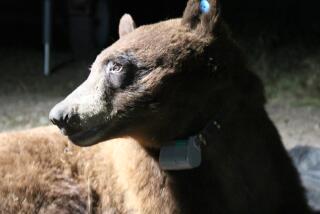Fatter Than the Average Bear, Thanks to Junk Food
- Share via
A study published last week affirms that what’s true for humans may also be true for bears: A junk-food diet and sedentary lifestyle lead to obesity and profound life changes.
A study of black bears in the Sierra Nevada found that those living in urban areas and gorging on garbage weigh as much as 30% more than bears in the wild and are about a third less active. Researchers concluded that they also are less likely to spend time in winter dens, and that they change their sleeping habits to allow for nocturnal dumpster diving.
The study, co-written by Jon P. Beckmann and Joel Berger, is published in the current issue of Journal of Zoology. Beckmann said that, although city bears may be less active than their country cousins, they are not couch potatoes; they simply live closer to their food sources.
“I wouldn’t say they are lazy; I would say they are opportunistic,” Beckmann said by phone from his research station in Rigby, Idaho. “For bears, garbage is the ultimate resource. It stays in the same place, it’s always available and it’s replenished after use.”
Biologists working for the Wildlife Conservation Society, the research arm of New York’s Bronx Zoo, tracked 59 radio-collared bears from 1997 to 2002. In 2001, researchers followed 10 bears living in the backcountry on the edge of the Great Basin near Lake Tahoe -- prime black bear habitat -- and 10 bears that had relocated to towns such as Incline Village.
Researchers for the Wildlife Conservation Society followed the bears and recorded their movements for 24 hours. Food becomes the focal point of bears’ lives while they fatten up before hibernation, and black bears consume around 20,000 calories a day during this time, Beckmann said.
Bears in the wild spent more than 13 hours a day roaming the woods foraging for food, researchers found. Bears near the easy pickings of convenience stores and fast-food shops spent only about 8 1/2 hours a day moving about.
The extra body fat on the less active bears means they have little reason to hibernate, Beckmann said. The study concluded that, because the urban bears’ food supply is constant, they spend an average of 42 fewer days in winter dens, if any.
Beckmann said that some of the black bears studied were substantially heavier than normal; a few males weighed as much as 600 pounds, more than twice the size of average males.
Though the added weight and other behavioral changes were not necessarily bad for the bears, the increased probability of contact with humans was. Wildlife managers across the West often are forced to destroy bears that become accustomed to human food. The concern for public safety spawned the campaign A Fed Bear is a Dead Bear, and in California, the Fish and Game Department’s Keep Me Wild program.
“Any time bears have a possibility of coming in contact with humans, that affects bear mortality,” Beckmann said. He said that, in addition to the risk of being killed by animal-control officers, urban bears often are hit by cars.
Researchers noticed that city bears switch to nighttime feeding to avoid human contact, but a surprising number bedded down right under the noses of urban residents. Beckmann said they had tracked several bears that slept, unnoticed, under the decks of lakeside cabins.
“The vast majority denned within 100 yards of houses,” he said. “They would find a place behind a convenience store or gas station and were content to sit on their day bed and lay in wait.”
Most of the bears fed by rummaging through trash bins that had not been properly bear-proofed, but researchers documented bears all over town. One broke into a woman’s home and, after ransacking her refrigerator, was found the next morning asleep in her hallway. Another was particularly fond of ice cream and began a spree of freezer break-ins.
“One broke into a professional candy maker’s storage and ate 24 pounds of butter in one sitting,” Beckmann said. “We like to stress: It’s not the bears’ fault. They are doing what comes naturally: feeding on what’s in front of them.”
Doug Updike, senior wildlife biologist for the state Department of Fish and Game, said that, as long as humans continue to build and live in bear habitat, the highly intelligent animals will continue to dine on our discards.
“They are so well adapted at being able to find food because of their strength and their claws and their intelligence,” said Updike, who oversees the state’s bruin program, which monitors California’s population of 30,000 black bears.
Unless communities adopt and enforce the use of bear-proof trash receptacles, he said, the animals will continue to find ways to get what they want.
“They are very smart at being able to figure how things work,” Updike said. “They are not out there turning doorknobs; if they want in a house, they might be inclined to tear the siding off. It’s what they do.”







